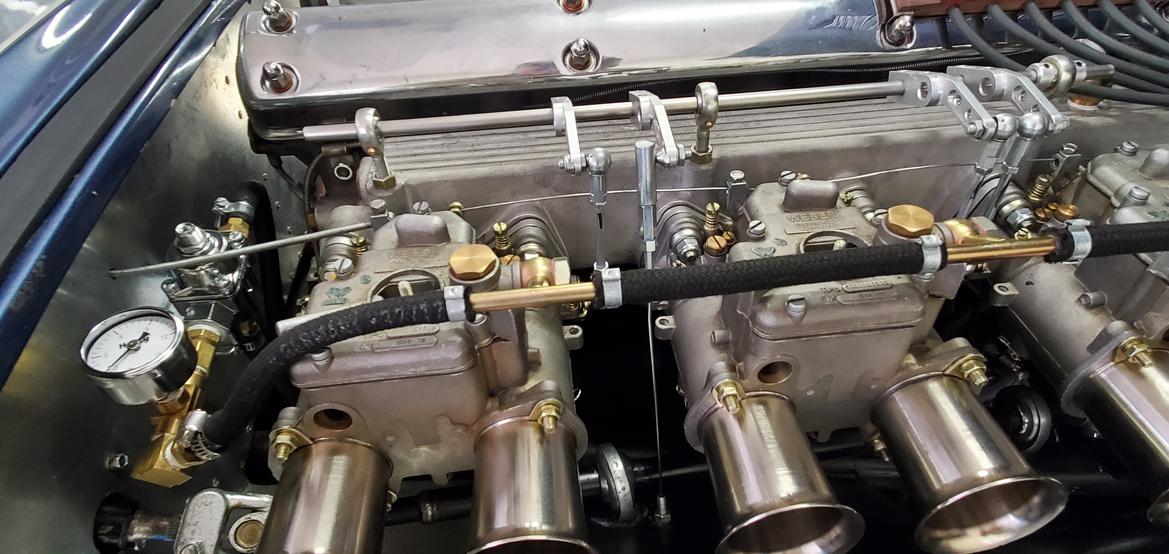
A lot of cars, especially those with side-draft Webers, tend to lose their prime after sitting for a while. This problem makes these engines difficult to start without pouring a bit of fuel into the float bowls. According to Weber expert Mike Pierce, the issue is common with some older Ferraris and is maddening for owners.
I have never had any issue with any of my Weber carb cars self priming, mind you they were all using electric fuel pumps.
I guess if it depended on a mechanical pump it might take some priming to fill the float bowls, but I wouldn't feel too good about having one of those rubber squeeze bulbs anywhere near my car. I have seen too many aged ones where the rubber starts cracking and eventually leaks. Having that happens on a car with electric pump would be very bad with gas spraying all over. Not so bad on an engine that was sucking through the bulb via a mechanical pump on the engine - you'd probably get gas dribbling, but not spraying around.
Not the same issue on boats - if you are using the bulb every time you use the boat you are monitoring bulb condition. On a car where many people don't open the bonnet unless something goes wrong (like the engine seizes for lack of oil, in some cases), the monitoring isn't likely to be anywhere near as frequent.
On the whole, I would think that installing a small flow through electric pump would be a better option for priming. I did that on my old Jensen with a big block Chrysler and sixpack. That was a lot of float bowls and once they dried out after sitting for a week or three, a lot of cranking to get the thing going and the little low pressure pump did the trick (you can plumb it in so it is a side circuit and doesn't interfere with the volume the mechanical pump wants to suck when running).
You can also install a one-way fuel check valve in the main line right before it gets to the carbs, keeping the fuel from draining back. Look for the ones that specifically state that they withstand ethanol rich fuels.
Have this problen with my 1971 Volvo 142S, after sitting a few weeks. Fuel will drain back in the line, leaving an air pocket the mechanical pump can't overcome, so I must discomnnect the hose at base of the Weber DGMS and suck gas up. I attatch a length of clear hose, to see that it is coming, before I get a mouthful ! Will get a FACET electric pump soon.
The nice thing about my '73 TR6 is that it's got a primer built into the factory mechanical pump. Just need to pop the hood and pull the lever 4-5 times. Works great.
In reply to wspohn :
I tend to agree with wspohn. Not only does the rubber boat bulb look a bit Mickey Mouse, it can't be a very safe mod.
I actually try to empty my Webers on my D-Type replica by turning off my electric pump while the engine is still running. I want to keep as much of that corn syrup out of my carbs and fuel system as possible if it sits for any length of time. After 4-6 weeks of sitting in the garage, I can still get the engine fired up again after 2-3 attempts with the starter. I would recommend an electric fuel pump over the rubber bulb pump. 
i have an electric low pressure pump on a pull siwth to start my 356 with webers, the pump runs for 3-4 minutes before cranking the engine and then it starts up using the accelrator pumps, webers have. The bulb is used by some 356 owners but I an not in favor as I see it as fire danager too
I have this issue on my '67 Corvette (327) and '62 Porsche 356 B S90. I bought a 200 ml syringe on Amazon and now prior to driving I put 75 ml or so gasoline into the carburetor vent tubes before starting. This means removing the air filter covers to get to the vents, but the cars start on one or two cranks afterwards.
You'll need to log in to post.